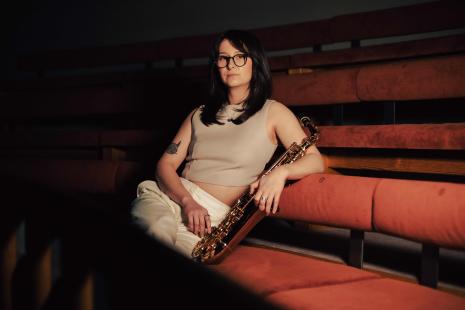
The Federal Government has extended the contract for 5 years until 2026. Thomas Oberender will hold the position of Director of Berliner Festspiele until 31 December 2026.
Author and curator Thomas Oberender has been Director and Managing Director of Berliner Festspiele since 2012. Berliner Festspiele realise year-round exhibitions at Gropius Bau as well as festivals like MaerzMusik – Festival for Time Issues, Theatertreffen, Musikfest Berlin and Jazzfest Berlin, four National Contests and events from various genres at Haus der Berliner Festspiele and other venues across the city. 2016 saw the launch of the programme series Immersion, conceived by Thomas Oberender. One of its achievements was to open planetariums for the projects of artists who work with devices of the digital era. The series has generated VR-productions, conferences, large-scale theatre installations and six time-based exhibitions. Among the latter, Philippe Parreno’s show 2018 at Gropius Bau was chosen as exhibition of the year. Formats such as “Palast der Republik” and “Down to Earth” extended the notion of immersion to reach into the fields of politics and climate research.
Professor Monika Grütters, Federal Government Commissioner for Culture and the Media and chairwoman of the board of directors of Kulturveranstaltungen des Bundes in Berlin GmbH, commented on the signing of the contract: “We have Thomas Oberender to thank for cultural events that startle us and demolish habitual points of view. Through the force of the artistically unexpected, he continues to allow us to see and experience things that were previously unheard of. In doing so, he has triggered several important social debates. By extending Thomas Oberender’s contract, the Federal Government sets a deliberate signal – and especially in these times – of its appreciation for art and theatre as a critical corrective in our society.”
Previously, Thomas Oberender had been Director of Drama at Salzburger Festspiele and Co-Director at Schauspielhaus Zürich. In his work there as well as at Ruhrtriennale and Schauspielhaus Bochum, he focused on creating large-scale topical formats spanning several years. He earned his doctorate in 1999 with a thesis on Botho Strauß and in 1997, he was a co-founder of the authors’ theatre association “Theater neuen Typs”. He has published plays, reviews and essays dealing with artists as well as political and aesthetic processes of transformation. He wrote the theatre books “Leben auf Probe”, “Der Gebärdensammler” and “Haupteingang ohne Nebeneingang“. His most recent publication was the book “Empowerment Ost”.
Since becoming Director, he has assembled a team of artistic directors including Yvonne Büdenhölzer, Nadin Deventer, Winrich Hopp, Berno Odo Polzer, Stephanie Rosenthal and Christina Schulz. Furthermore, he appointed Frie Leysen and Matthias von Hartz to head the performing arts festival Foreign Affairs, founded in 2012, as well as Bert Noglik and Richard Williams for Jazzfest Berlin. Together, they have shaped the programme of Berliner Festspiele in recent years, including contemporary exhibitions, large-scale European premieres like “A 24-Decade History of Popular Music” by Taylor Mac or the original production “Nationaltheater Reinickendorf” by Vinge/Müller, genre-crossing formats like “The Long Now” or “Rituals of Care”, original VR-productions, innovative discourse formats like “Thinking Together” or “Into Worlds” as well as the foundation of Tanztreffen der Jugend as part of the support structure for emerging talents in 2014. Furthermore since 2018, Nadin Deventer has been the long-standing Jazzfest Berlin’s first female artistic director, and two years ago, Theatertreffen, headed by Yvonne Büdenhölzer, introduced a female quota among the directors of the “ten most remarkable productions”.
Thomas Oberender: “Berliner Festspiele will have their 70th anniversary in 2021, and they have become a venue for exploring the future. Our festivals and exhibitions follow the ever changing artistic practice with a freedom that is rarely found in the cultural sector. I am delighted that this development is being shaped by a terrific team. These colleagues have changed me, and together we have changed, but also continued, preserved and protected Berliner Festspiele, carrying the institution’s treasures into the future. From 2022, we will have the privilege of filling a freshly refurbished Haus der Berliner Festspiele with art, and “Berliner Festspiele on Demand”, a new digital venue created during the times of COVID-19, is a platform that will not be idle in the future. I would like to thank Monika Grütters for placing her trust in me and granting Berliner Festspiele and its two affiliated houses support both for projects and the institution through her ministry.”
Berliner Festspiele are a division of Kulturveranstaltungen des Bundes in Berlin (KBB) GmbH and are supported by the Federal Government Commissioner for Culture and the Media by virtue of a decision of the Federal German Bundestag.
Photo: Dr Thomas Oberender, © Christoph Neumann
Author and curator Thomas Oberender has been Director and Managing Director of Berliner Festspiele since 2012. Berliner Festspiele realise year-round exhibitions at Gropius Bau as well as festivals like MaerzMusik – Festival for Time Issues, Theatertreffen, Musikfest Berlin and Jazzfest Berlin, four National Contests and events from various genres at Haus der Berliner Festspiele and other venues across the city. 2016 saw the launch of the programme series Immersion, conceived by Thomas Oberender. One of its achievements was to open planetariums for the projects of artists who work with devices of the digital era. The series has generated VR-productions, conferences, large-scale theatre installations and six time-based exhibitions. Among the latter, Philippe Parreno’s show 2018 at Gropius Bau was chosen as exhibition of the year. Formats such as “Palast der Republik” and “Down to Earth” extended the notion of immersion to reach into the fields of politics and climate research.
Professor Monika Grütters, Federal Government Commissioner for Culture and the Media and chairwoman of the board of directors of Kulturveranstaltungen des Bundes in Berlin GmbH, commented on the signing of the contract: “We have Thomas Oberender to thank for cultural events that startle us and demolish habitual points of view. Through the force of the artistically unexpected, he continues to allow us to see and experience things that were previously unheard of. In doing so, he has triggered several important social debates. By extending Thomas Oberender’s contract, the Federal Government sets a deliberate signal – and especially in these times – of its appreciation for art and theatre as a critical corrective in our society.”
Previously, Thomas Oberender had been Director of Drama at Salzburger Festspiele and Co-Director at Schauspielhaus Zürich. In his work there as well as at Ruhrtriennale and Schauspielhaus Bochum, he focused on creating large-scale topical formats spanning several years. He earned his doctorate in 1999 with a thesis on Botho Strauß and in 1997, he was a co-founder of the authors’ theatre association “Theater neuen Typs”. He has published plays, reviews and essays dealing with artists as well as political and aesthetic processes of transformation. He wrote the theatre books “Leben auf Probe”, “Der Gebärdensammler” and “Haupteingang ohne Nebeneingang“. His most recent publication was the book “Empowerment Ost”.
Since becoming Director, he has assembled a team of artistic directors including Yvonne Büdenhölzer, Nadin Deventer, Winrich Hopp, Berno Odo Polzer, Stephanie Rosenthal and Christina Schulz. Furthermore, he appointed Frie Leysen and Matthias von Hartz to head the performing arts festival Foreign Affairs, founded in 2012, as well as Bert Noglik and Richard Williams for Jazzfest Berlin. Together, they have shaped the programme of Berliner Festspiele in recent years, including contemporary exhibitions, large-scale European premieres like “A 24-Decade History of Popular Music” by Taylor Mac or the original production “Nationaltheater Reinickendorf” by Vinge/Müller, genre-crossing formats like “The Long Now” or “Rituals of Care”, original VR-productions, innovative discourse formats like “Thinking Together” or “Into Worlds” as well as the foundation of Tanztreffen der Jugend as part of the support structure for emerging talents in 2014. Furthermore since 2018, Nadin Deventer has been the long-standing Jazzfest Berlin’s first female artistic director, and two years ago, Theatertreffen, headed by Yvonne Büdenhölzer, introduced a female quota among the directors of the “ten most remarkable productions”.
Thomas Oberender: “Berliner Festspiele will have their 70th anniversary in 2021, and they have become a venue for exploring the future. Our festivals and exhibitions follow the ever changing artistic practice with a freedom that is rarely found in the cultural sector. I am delighted that this development is being shaped by a terrific team. These colleagues have changed me, and together we have changed, but also continued, preserved and protected Berliner Festspiele, carrying the institution’s treasures into the future. From 2022, we will have the privilege of filling a freshly refurbished Haus der Berliner Festspiele with art, and “Berliner Festspiele on Demand”, a new digital venue created during the times of COVID-19, is a platform that will not be idle in the future. I would like to thank Monika Grütters for placing her trust in me and granting Berliner Festspiele and its two affiliated houses support both for projects and the institution through her ministry.”
Berliner Festspiele are a division of Kulturveranstaltungen des Bundes in Berlin (KBB) GmbH and are supported by the Federal Government Commissioner for Culture and the Media by virtue of a decision of the Federal German Bundestag.
Photo: Dr Thomas Oberender, © Christoph Neumann




